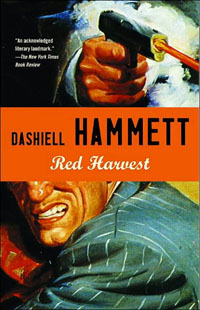 Red Harvest
Red Harvest
by Dashiell Hammett
Vintage, 1989
224 pages / $14 Buy from Amazon
We’re finished with another election cycle and it’s all same old, same old. For months we’ve been overrun by the expected crap, the lies, corruption, false promises, and general deception. While it might be nice to escape into something delightful, something by Eric Kraft or an imaginative dance like Italo Calvino’s The Baron In The Trees, if you want to read a book that stabs into the thick of the American political scene, then Dashiell Hammett’s first novel is what you need to get your claws on asap. It’s a novel that reminds you how unpleasant politics has always been. Plus, it’s got a lot of great zingers.
There’s a point when Dashiell Hammett’s Red Harvest stops being a detective story and turns into a blood bath. It’s at this point where the novel switches from being a regular tale of intrigue and personal conflict and turns into a masterful portrait of political corruption and violence. Halfway through, our man The Continental Op does a body count. “There’s been what?” he asks the devious dame Dinah Brand. “A dozen and half murders since I’ve been here.” He lists the dead and says, “That’s sixteen of them in less than a week, and more coming up.” The Continental Op copes the way they all used to. He gets drunk, takes some laudanum, and for an instant feels the rosiness of the world. He wakes up with another dead body on his hands. Another morning, another body, another hang-over. It’s a lesson in how any place or day can become a hell-trap. “If I don’t get away soon,” our man says, “I’ll be going blood-simple like the natives.”
Red Harvest is a great political novel because in the end its characters care about only one thing: power. There are no beliefs, no ideologies, no speeches. There’s just power. There are interpersonal squabbles over who killed whose brother or son, but these get forgotten in the struggle over who gets to control the quaint, ruined town of Personville, aka Poisonville. Our man The Continental Op is the only operator interested in salvaging a bit of justice from this wreckage. He sets the mobsters, police, and political head honcho up against each other and keeps prodding until more murders get committed. There’s the usual assortment of baddies and toughs, Pete the Finn, Lew Yard, Whisper, police chief Noonan, and Old Elihu, who’s the most vicious of them all and also The Continental Op’s employer.
While later novels like The Maltese Falcon and The Thin Man are better known, Red Harvest is Dashiell Hammett’s best work. Here he’s at his most mature, dark, and unrelenting. Each sentence is a quick stick with a shank. Each chapter hits right between the eyes. There’s an indifferent viciousness to the language that’s skillfully styled and entertaining. “Her face was the face of a girl of twenty-five already showing signs of wear,” The Continental Op thinks when he first meets Dinah Brand. “The telephone was worked overtime. The kitchen door was worked as hard, letting men in and out,” he thinks as one more disaster is put into effect. “The house filled with men, smoke, tension.” Hammett writes sentences so good they’re proto-clichés. All of this makes for a book that’s insanely underline-able.
In Poisonville, politics is blood sport. Red Harvest explores how the corruption in a certain place can become so entrenched there’s no way to expurgate it except through bloodshed. Of course, this is like trying to clean house with a flamethrower. In the end there’s no mess and a lot of ashes stinking up the breeze. The Continental Op doesn’t care. He wants to see his mission of purifying Poisonville through. That’s what he’s been hired to do, clean out this spoiled little town, population 40,000. His mission is successful and meaningless. The inhabitants of Poisonville care more about power than their own lives, which means they’re just as ready to die as they are to kill. The bleakness and bile build. By the end, there’s enough blood to fill a billiard hall and nothing and nobody worth saving. It’s the most damning and enjoyably readable vision of American politics that’s ever been written.
***
Alex Kalamaroff lives in Boston. He is 25 years old. He likes adventure, fabulousness, and coffee. You can email him at alexander.kalamaroff@gmail.com. He is writing a novel about Los Angeles.

Tags: Alex Kalamaroff, Dashiell Hammett, Red Harvest

I remember the book feeling relentless in its denial of succor.
On that cover, they should’ve put the snarl on top and the gun below.
I’ve read both that Kurosawa did not use this book as the template for Yojimbo, and that he definitely did. The parallels seem too essential to be coincidental–except that the film has the moral point that Hammett’s mouth overfilled with iron filings and ash doesn’t. Through Kurosawa, the story’s become bigger than just “America”, hasn’t it? –a 20th c parable of The Only Corrupt Species.
Hammett is a great artist–even though I have yet to understand one of his plots. Thanks for this, Alex.
Dear Scott, glad you liked it.
Yeh on Hammett’s plots. … They’re eeksy messy. The plots for The Dain Curse and The Glass Key are even more wacky and obtuse than Red Harvest’s. But then, you can’t have everything I guess?
Hope you’re enjoying the snow, wherever you are. Best, –Alex K.
[…] and deeper motivations. “There are no beliefs, no ideologies, no speeches,” Kalamaroff writes. “There’s just […]